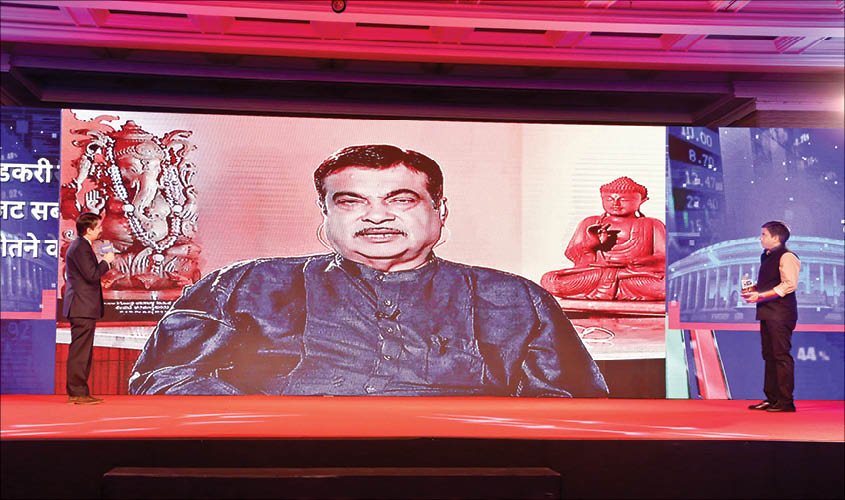Senior political leaders spoke about the Union Budget 2019 at iTV Network’s conclave on Saturday.
New Delhi: Union Minister of State for Finance and Corporate Affairs, Anurag Thakur on Saturday said the great impetus to infrastructural growth by the Narendra Modi government would lead to large scale job creation in the country. At the interactive inaugural session of the event “Vikas Ke Vishwas Ka Budget” organised by ITV Network, Thakur said it was important to regularise the unorganised sectors in the country so that even the common people could get maximum benefits from government initiatives.
“The Modi government is committed to creating jobs for people. The major infrastructure push by the government is a step in this direction. More than 5,000 government schemes for women are already there; the need is to implement them and extend the benefits to empower women,” Thakur said.

The BJP leader lauded the GST implemented by the Modi Sarkar in its last stint, saying the government did a commendable job by stabilising the economy after bringing GST in just two years. “Worldwide countries have taken at least four years to stabilise after introducing GST, but India did it in just two years. Also, no government in any country returned to power post-GST but the Modi government came back with a bigger mandate,” he said.
Thakur insisted on bringing 100 per cent FDI in the insurance sector and added that the Modi government was working on promoting the use of solar energy and electric vehicles in the country in order to fight pollution.

Union Ministers Nitin Gadkari and Pralhad Joshi addressing the conclave also exuded confidence that the first Budget of Modi 2.0 will bring the Indian economy back on the fast track and create jobs in the country. The ministers argued that the Modi government’s decision to invest Rs 100 lakh crore on infrastructure in next five years was crucial in taking India’s economy to $5 trillion. The ministers said the government was committed to fast-track the progress of infrastructure development in the country in order to achieve the target.
Gadkari, Union Minister for Road, Transport and Highways and MSME, emphasised that the government has made long-term, mid-term as well as short-term policies for overall economic growth of the country. “I am convinced that the Budget presented by Finance Minister Nirmala Sitharaman has a mix of all such policies. The huge infrastructure boost to the country will take India on the path of being the world’s largest economy,” he said.

Gadkari also presented the roadmap for infrastructure growth in the country, saying his ministry targeted to construct 40 km of highways everyday as compared to 21 km per day. On the economic front, he said, it was important to bring down import and encourage export in the country. “The idea is to increase production capacity in the country. This can be done by reducing import and increasing export,” he said.
The minister said the Modi government has laid great focus on skill development in the country, “The government has plans to open 100 technology centres that will double as research and skill development centres across the country. Each of these centres will be set up at the cost of Rs 200 crore. We also urge the industries in the private sector to open such training and skill development centres. The country will require a large number of skilled manpower in coming days,” Gadkari said.

Gadkari maintained that the MSME sector in the country contributed 29 per cent of the GDP and expressed confidence that the same would go up to 50 per cent in the next five years. He said the MSME sector alone would create 15 crore jobs in the country.
Parliamentary Affairs Minister Pralhad Joshi said the government was working in the direction of “One Nation, One Grid” so as to ensure uninterrupted power supply to every household even in the remotest of villages. Joshi also said that providing clean drinking water to every family was the top priority and added that the government has already initiated a lot of works in the last two months in these areas.
Leaders from the corporate sector and market experts also lauded the Budget, terming it “fiscally responsible”. Gurcharan Das, former CEO, P&G, said the government would have to deliver on Budget announcements so as to bring the economy back on track which had slowed down during the last couple of years. Naina Lal Kidwai, chairperson of Advent Pvt Equity India Advisory Board, said if the government succeeded in investing Rs 100 lakh crore on infrastructure, it would make a huge difference.

The event also saw a heated debate between BJP leader Shyam Jaju and Congress MP KTS Tulsi. The Congress MP sought to blame the government for slowing down the legal reforms and raised the issue of farmers’ suicide in the country. Jaju, however, argued that the farmers’ suicide had stopped in the country as a result of the pro-farmers policies by the Modi government.
Two first-time MPs—Malook Nagar from BSP and Anubhav Mohanty of BJD—also expressed their views on the Budget. Nagar accused the Modi government of failing to handle the country’s economy properly while Mohanty emphasised on coordination and harmony between the Centre and the state for all-round development of states, including the poor ones like Odisha.

Leaders from the real estate sector—Nayan Raheja, Executive Director of Raheja Developers, Mohit Arora, MD, Supertech and Prashant Solomon, MD, Chintels India—expressed hope that the Budget would help in bringing accountability in the real estate sector. They said the biggest challenge that the industry faced today was completing the projects timely and handing over them to the investors. They said the future of the real estate sector in India was bright with more and more houses being built for the middle class and the economically weaker sections, which was a departure from the early days when houses were mostly built for the upper-class buyers.





